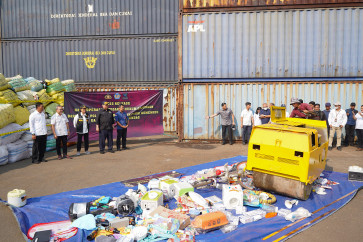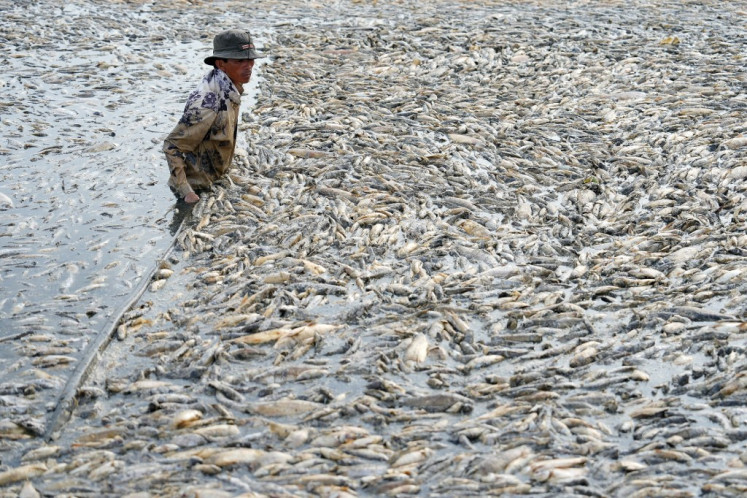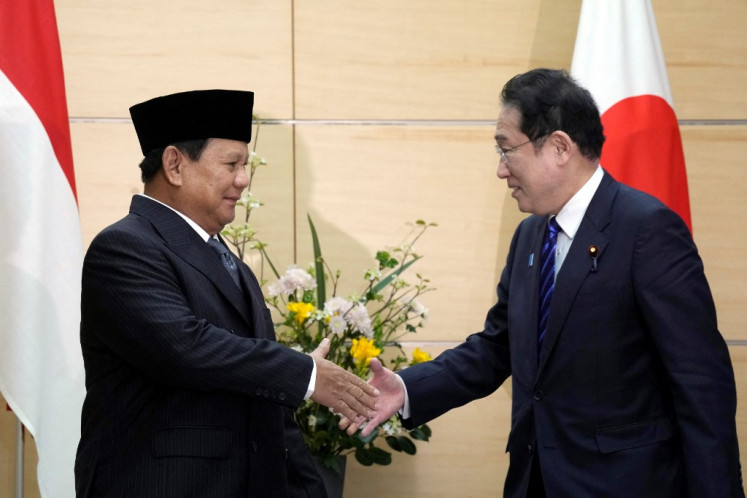Biofuels for the poor
After being criticized for being slow to develop the local biofuel industry, the Indonesian government has finally issued two important policies; first, a decree issued last year obliging industries and the transportation sector to use biofuels; and second, its recent decision to provide subsidies for sales of the fuel

After being criticized for being slow to develop the local biofuel industry, the Indonesian government has finally issued two important policies; first, a decree issued last year obliging industries and the transportation sector to use biofuels; and second, its recent decision to provide subsidies for sales of the fuel.
Both are expected to provide a strong impetus for growth in the country’s nascent biofuel industry.
In issuing these policies, the government has underlined its commitment to seeing the national biofuel development program through to fruition.
Many years from now, Indonesia may emerge as one of the top biofuel producers in the world. If this occurs, people will look back on these two policies as the most important landmarks in Indonesia’s energy history.
The decree, issued by the Energy and Mineral Resources Ministry in September last year, requires the transportation sector to use oil-based fuels blended with 1 percent biofuel (as of January this year), while industries and power plants must use a biofuel blend of between 0.25 and 2.5 percent. Next year, the biofuel content will be increased to between 2.5 and 3 percent for transportation, 5 percent for industry, and 1 percent for power plants.
Recently, the government and House of Representatives agreed to set aside a subsidy of Rp 831 billion (about US$ 70 million) or Rp 1,000 per liter for biofuel sales. Since mid-2006, when the government launched its program to promote the use and production of biofuels, the intiative has seen limited, if any, positive results.
The number of gas stations selling biofuels has in fact declined, and the national biofuel output has also decreased. Few people are interested in buying the fuel, because people are not familiar with it and it costs more than heavily-subsidized oil-based fuels.
The subsidy for biofuels and the obligation to use the fuel are expected to make the new fuel competitive with oil-based fuels.
But, the world is excited about biofuels, and so is Indonesia. Biofuels are considered by some as a solution to the problems of global warming and a way to avoid over inflated future oil prices. The oil prices, though having declined sharply from nightmarish levels of more than $147 per barrel mid last year, are projected to rebound strongly once the current economic crisis is over – and even rise to higher than mid-2008 levels — due to a decline in hydrocarbon resources and few discoveries of new oil fields.
As far as Indonesia is concerned, biofuels could help solve a number of serious problems we now face in the energy sector. We have become a net oil importer for many years now; our hydrocarbon resources have been steadily declining; oil-based fuels account for most of our energy consumption; oil imports are continually increasing; and the government has been forced to allocate huge amounts of money to subsidize oil-based fuels every year.
From an economic perspective, a fuel subsidy is a bad policy, but completely removing the subsidy would not be easy given the social and political consequences of such a move.
Worst of all, however, is the subsidy on oil-based fuels. Consider this: Since Indonesia now produces much less oil than the national consumption, every year PT Pertamina (as the distributor of subsidized fuels), using the subsidy provided by the government, imports billons of dollars worth of crude oil or oil-based fuels from countries that have an output surplus. The subsidy funds thus end up in the pockets of fuel traders in Singapore and oil exporting countries, such as those in the Middle East, that all benefited massively when oil prices went through the roof last year.
This is a sad situation, in view of the fact that we have huge amounts of alternative energy resources – including biofuels -- that remain largely untapped. If we subsidize biofuels, the subsidy funds will end up in the pockets of local companies, most preferably farmers – and thus help alleviate poverty in rural areas.
While the development of biofuels would bring a lot of benefits to Indonesia, the challenges that lie ahead are not small either.
One of the biggest challenges is to make sure the biofuel program brings benefits to the poor. This is what President Susilo Bambang Yudhoyono promised in his speech in 2006 when he launched the program.
The National Team for Biofuel Development also placed an emphasis on the poverty-alleviation aspect in its roadmap for biofuels development. In its roadmap, the agency says that the program will create at least one million jobs and significantly increase the value of many areas of land owned by farmers.
The government could work toward achieving its poverty-alleviation goal, for instance, by prioritizing support for biofuels produced by farmers/cooperatives or big companies that use land products of farmers as raw materials.
Another big challenge is to address concerns over the possible impacts of the biofuel program on forests and food availability. At present, our biofuel producers mostly use crude palm oil as a raw material. This has sparked criticism, since by using a food source for fuel in order to solve the energy crisis, we are also creating a food crisis. There are also fears that, in anticipation of growing demands from biofuel sector, CPO firms will continue a trend of clearing forest areas for plantations, thus creating massive environmental problems.
To be fair, the United States and Brazil, the world’s leading biofuels producers, use corn and sugarcane respectively – both are foods – to produce biofuels.
The use of CPO for biofuel can also be considered reasonable, in the light of the fact that it is the most abundant raw material available. However, the use of the commodity should be greatly discouraged in the future. Instead we should be using non-food crops that are friendlier to the environment, such as jatropha.
The author is a staff writer of The Jakarta Post.









